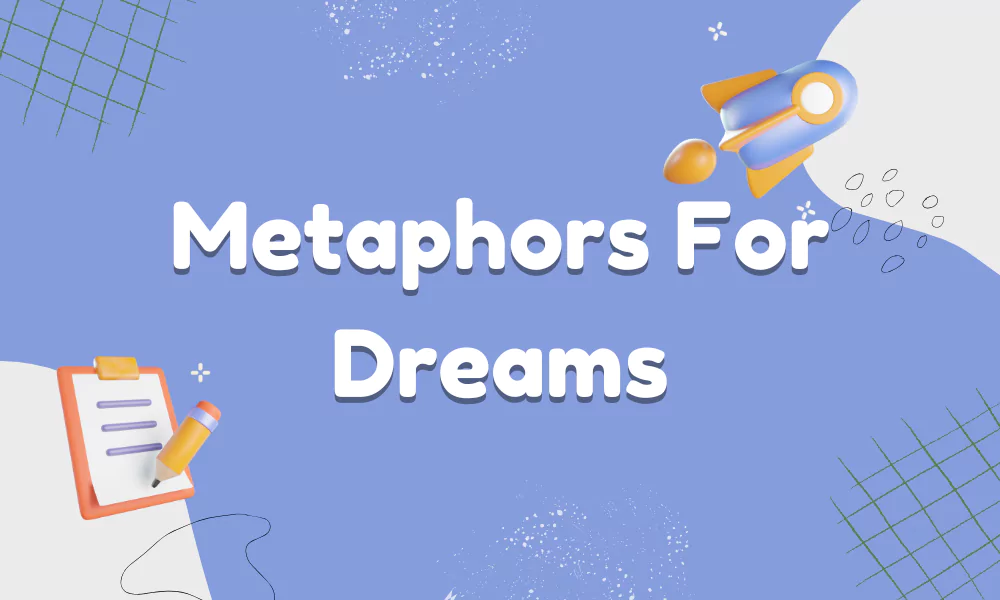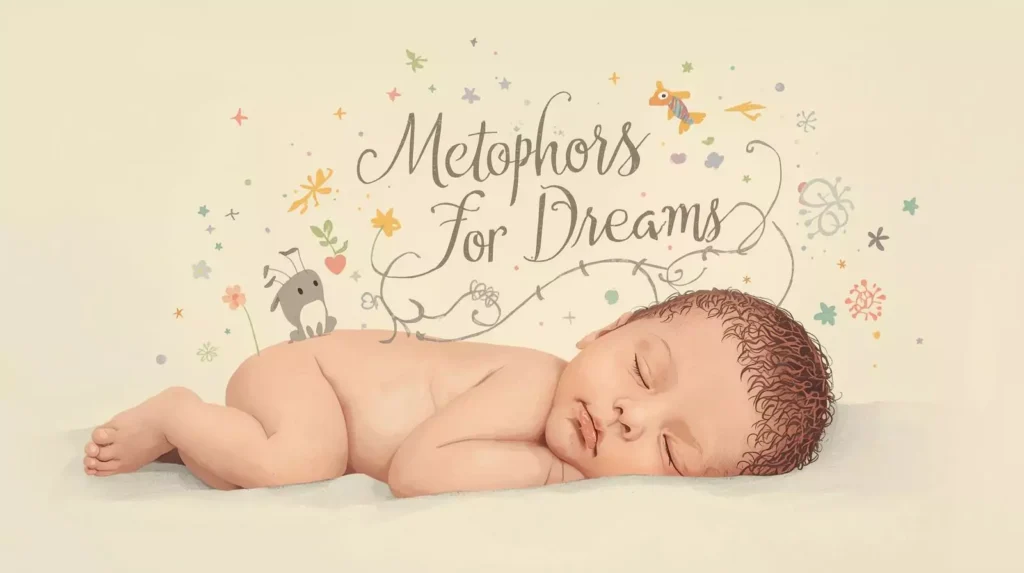Metaphors for Dreams – Timeless Symbols of Hopes, Visions, and Desires

Dreams have always been one of life’s greatest mysteries, part puzzle, part poetry. They slip into our sleep as fleeting images yet hold meanings that can inspire, confuse, or even haunt us. For centuries, people have turned to metaphors to make sense of these elusive experiences, comparing dreams to doors, treasures, stars, or whispers. Metaphors give us a powerful way to translate the intangible into something we can grasp, turning the surreal world of dreams into insights about our hopes, fears, and desires.
What are Metaphors for Dreams?
Metaphors for dreams are imaginative comparisons that help us understand the abstract and often mysterious nature of dreams. Instead of explaining them literally, metaphors describe dreams as something familiar like doors, puzzles, stars, or journeys, making their hidden meanings easier to grasp. By using metaphors, we give shape to the intangible, capturing how dreams can inspire us, reflect our emotions, or guide us toward our goals.

Everyday Metaphors for Dreams
- Dreams are doors – They open pathways to hidden parts of ourselves.
Example: “Her dreams became doors to memories she had locked away.” - Dreams are puzzles – They challenge us to piece together meaning.
Example: “His dream was a puzzle waiting to be solved.” - Dreams are mirrors – Reflecting our emotions and inner state.
Example: “The dream acted like a mirror of his hidden fears.” - Dreams are rivers – Flowing constantly, sometimes calm, sometimes stormy.
Example: “Her dreams flowed like rivers through her restless sleep.” - Dreams are maps – Guiding us toward goals or deeper truths.
Example: “He followed his dream like a map to his future.” - Dreams are whispers – Subtle messages from within.
Example: “Her dream was a whisper reminding her to be brave.” - Dreams are shadows – Lurking images that stay with us.
Example: “The nightmare clung to him like a shadow.” - Dreams are fires – Burning with passion or fear.
Example: “Her ambition was fueled by dreams burning like fire.” - Dreams are ladders – Helping us climb toward success.
Example: “Each small goal was a rung on the ladder of his dream.” - Dreams are seeds – Small beginnings that can grow into big realities.
Example: “That dream was the seed of her future business.” - Dreams are storms – Chaotic and overwhelming.
Example: “His mind was shaken by a storm of dreams.” - Dreams are journeys – Taking us places beyond the ordinary.
Example: “Her dream carried her on a journey through the unknown.” - Dreams are lights – Guiding us out of darkness.
Example: “His dreams were the light that kept him moving forward.” - Dreams are cages – Trapping us in fear or limitation.
Example: “She felt her nightmare was a cage with no escape.” - Dreams are windows – Giving us glimpses into hidden worlds.
Example: “His dream was a window into his childhood.” - Dreams are treasures – Holding hidden value.
Example: “She treated her dream as a treasure worth chasing.” - Dreams are clouds – Shifting, fleeting, and hard to hold.
Example: “His dream faded like a cloud in the morning sun.” - Dreams are bridges – Connecting the conscious and subconscious.
Example: “Her dream built a bridge between her past and present.” - Dreams are mirrors of hope – Reflecting what we long for.
Example: “Her dream mirrored her hope of finding love.” - Dreams are songs – Expressing emotions through rhythm and flow.
Example: “The dream sang to her like a soft lullaby.” - Dreams are gardens – Spaces where ideas bloom.
Example: “He planted his ideas in the garden of his dreams.” - Dreams are footprints – Leaving traces of where we’ve been.
Example: “Her dreams left footprints on her waking thoughts.” - Dreams are waves – Rising, falling, and washing over us.
Example: “A wave of dreams swept through his restless mind.” - Dreams are mirrors of desire – Showing what we truly want.
Example: “His dream revealed his hidden desire for freedom.” - Dreams are wings – Giving us the power to fly beyond limits.
Example: “Her dreams gave her wings to rise above fear.” - Dreams are echoes – Carrying distant voices and memories.
Example: “His dream echoed the words he longed to hear again.” - Dreams are roads – Leading us to new destinations.
Example: “Every dream was another road to explore.” - Dreams are masks – Hiding truths behind strange symbols.
Example: “Her dream wore the mask of a childhood memory.” - Dreams are fireside stories – Tales told by the subconscious.
Example: “The dream played out like a fireside story from her past.” - Dreams are mirrors of the soul – Reflecting our deepest essence.
Example: “His dream felt like a mirror of his very soul.” - Dreams are cages of fear – Trapping us in anxieties.
Example: “The nightmare was a cage of fear he couldn’t break.” - Dreams are books – Pages filled with untold stories.
Example: “Her dream read like a mysterious book.” - Dreams are stages – Where our inner dramas play out.
Example: “Her dream was a stage where her fears performed.” - Dreams are rivers of thought – Carving paths through the mind.
Example: “The river of dreams carried him into morning.” - Dreams are mountains – Challenging us to climb higher.
Example: “Her dream was a mountain she longed to conquer.” - Dreams are flames – Flickering with possibility.
Example: “The flame of his dream never went out.” - Dreams are shelters – Giving comfort in times of struggle.
Example: “Her dream became a shelter from her worries.” - Dreams are mirrors of memory – Reflecting past experiences.
Example: “The dream mirrored a memory she had forgotten.” - Dreams are whispers of tomorrow – Hinting at what lies ahead.
Example: “Her dream whispered of changes coming soon.” - Dreams are playgrounds – Spaces for imagination to run free.
Example: “His dream was a playground where anything was possible.”
Cultural & Literary Metaphors for Dreams
- Dreams are journeys (Homer’s Odyssey) – Symbolizing life’s trials.
Example: “Like Odysseus, his dreams carried him across uncharted seas.” - Dreams are illusions (Shakespeare’s The Tempest) – Fleeting and unreal.
Example: “Her dreams dissolved like illusions in the morning light.” - Dreams are shadows of reality (Plato’s Allegory of the Cave) – Reflections of truth.
Example: “He believed dreams were shadows of a deeper reality.” - Dreams are messengers (Greek mythology – Morpheus) – Bringing messages from gods.
Example: “Her dream felt like a message carried by Morpheus himself.” - Dreams are prophecies (Biblical Joseph) – Foretelling the future.
Example: “He feared the dream was a prophecy of what was to come.” - Dreams are myths – Stories woven into cultural identity.
Example: “Her dream read like an ancient myth passed down for centuries.” - Dreams are visions (Native American traditions) – Spiritual guidance.
Example: “The dream was a vision that guided him through hardship.” - Dreams are magic carpets (Arabian Nights) – Transporting us to wondrous places.
Example: “His dream carried him away on a magic carpet of imagination.” - Dreams are theaters (Calderón’s Life is a Dream) – Stages where life plays out.
Example: “In her dream, she was both the actress and the audience.” - Dreams are oracles (Greek tragedies) – Predicting fate.
Example: “His nightmare felt like an oracle of doom.”
Creative & Modern Metaphors for Dreams
- Dreams are apps – Tools that help us process information.
Example: “His dream worked like an app, organizing his emotions.” - Dreams are playlists – A mix of moods, stories, and emotions.
Example: “Her dream was a playlist of memories on shuffle.” - Dreams are screensavers – Random images playing across the mind.
Example: “His dream looked like a screensaver of surreal pictures.” - Dreams are Wi-Fi signals – Invisible but connecting us to something bigger.
Example: “She felt her dream was a Wi-Fi signal linking her to another world.” - Dreams are video games – Interactive challenges with levels and quests.
Example: “The nightmare played out like a video game she couldn’t escape.” - Dreams are hashtags – Grouping scattered thoughts into themes.
Example: “The dream was a hashtag of his hidden worries.” - Dreams are podcasts – Narrations from the subconscious.
Example: “Her dream spoke like a late-night podcast in her mind.” - Dreams are virtual reality – Immersive, surreal, and lifelike.
Example: “The dream was a VR experience too real to ignore.” - Dreams are emails from the subconscious – Delivering hidden messages.
Example: “His dream felt like an email marked urgent from his subconscious.” - Dreams are trending topics – Constantly shifting with what’s on our mind.
Example: “Her dream was a trending topic in her restless thoughts.”
Read: Metaphors for Loneliness

Synonyms of Dreams With Meanings
| Synonym | Meaning |
|---|---|
| Visions | Mental images or experiences, often carrying symbolic meaning. |
| Aspirations | Strong desires or ambitions for the future. |
| Fantasies | Imaginative or unreal scenarios created by the mind. |
| Goals | Concrete objectives a person aims to achieve. |
| Illusions | False or deceptive appearances that feel real. |
| Nightmares | Frightening dreams that cause fear or anxiety. |
| Imaginings | Creative mental pictures or ideas. |
| Ambitions | Deep personal drives to reach success. |
| Hopes | Expectations or desires for something good to happen. |
| Reveries | Daydream-like states of pleasant imagination. |
How to Use Dreams Metaphors in Writing & Speaking
- Connect to Emotions – Use metaphors that reflect inner feelings (e.g., “Dreams are mirrors of our fears”) to create emotional depth.
- Match the Context – Choose metaphors that suit your audience: poetic ones for storytelling, simple ones for casual conversations.
- Blend the Real with the Surreal – Mix everyday imagery with dreamlike qualities (e.g., “Dreams are maps written in invisible ink”) for creativity.
- Use Contrast for Impact – Compare dreams to both positive and negative elements (stars vs. shadows) to show their dual nature.
- Make Them Actionable – Tie the metaphor back to real life (e.g., “Climb the ladder of your dreams”) so it inspires or motivates.
Read: Metaphors for Snow
FAQs
Conclusion
Dreams are more than fleeting images in the night yet they are powerful symbols of our hopes, fears, and imagination. By using metaphors, we can give meaning to the intangible, turning dreams into doors, maps, fires, or wings that inspire us in real life. Synonyms like visions, aspirations, fantasies, and reveries further expand how we talk about dreams, helping us connect both emotionally and practically. Whether in writing, speaking, or daily reflection, dream metaphors and synonyms enrich our language, deepen our self-understanding, and inspire us to pursue what truly matters.
